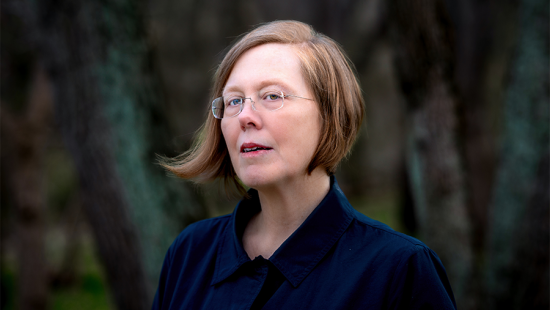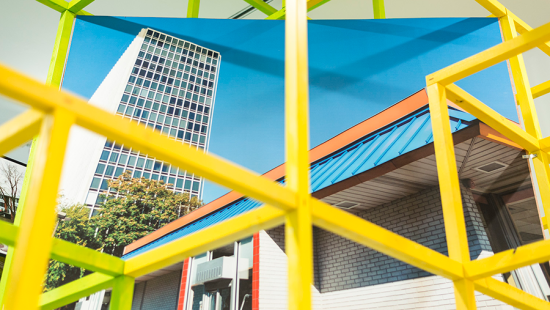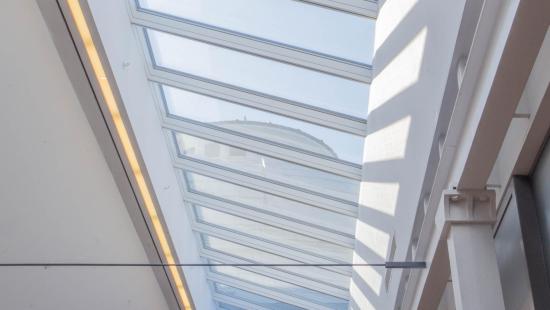Spring 2021: New Collaborations and Conversations at AAP
After a fall like no other at AAP, the spring ahead promises continued expansion, new classes and collaborations, and advancing critical conversations across the college.
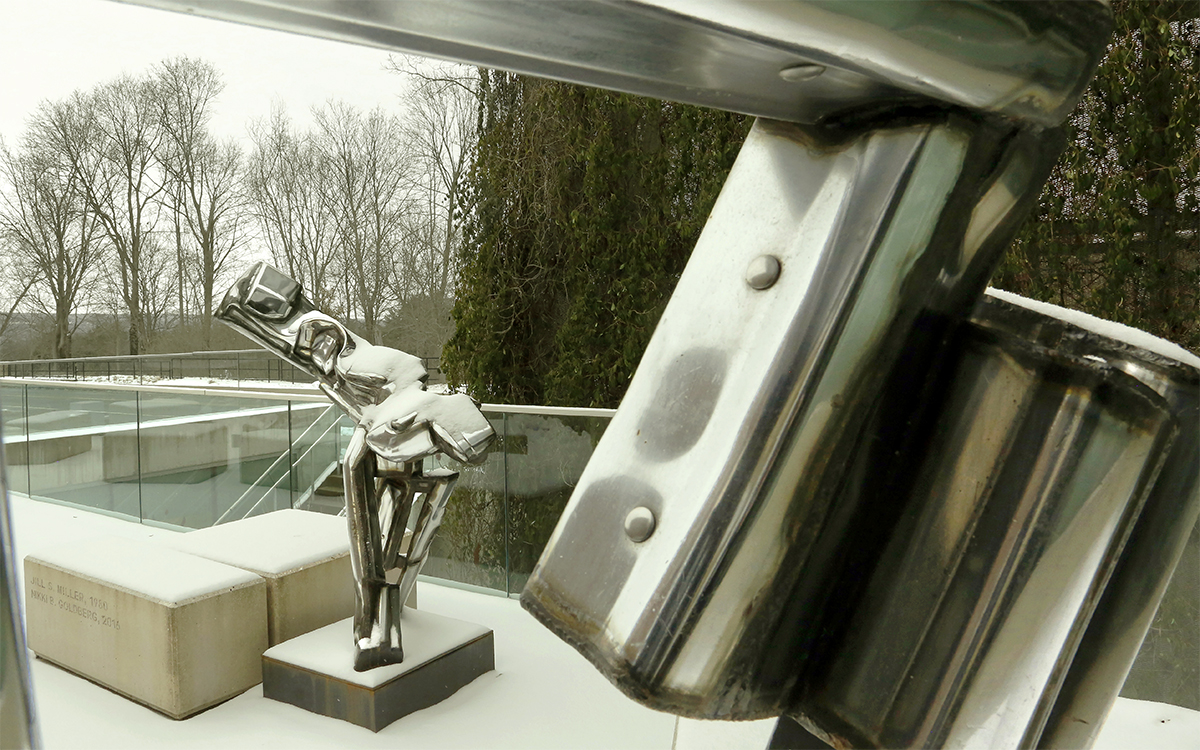 William Staffeld / AAP
William Staffeld / AAP
Early September 2020 began what Cornell President Martha Pollack and AAP Dean J. Meejin Yoon foresaw as an academic year unlike any the university had ever experienced. The spring 2021semester at AAP promises a continuation of many of the changes, adaptations, and innovations that demonstrated how new models for operations and instruction could provide safe, high-level, and even expanded environments for learning.
"While we faced an incredible amount of newness last fall — this spring, we have the distinct advantage of hindsight as we navigate the months ahead," wrote Dean Yoon in her welcome back message to the AAP Community. "We come back to our studies, work, and community with what we have experienced, shared, and learned. Together, we have seen what we can do, not only to take on our own most immediate challenges but to collectively bear the challenges of our shared world."
Added classes and studio offerings will provide cross-disciplinary, collaborative spaces for work related to issues and challenges facing the world and AAP's disciplines. Co-curricular programming will also see architecture, art, and planning come together to discuss, propose, and share creative responses to problems that span scales ranging from the personal to the global.
Spaces for cross-disciplinary collaboration
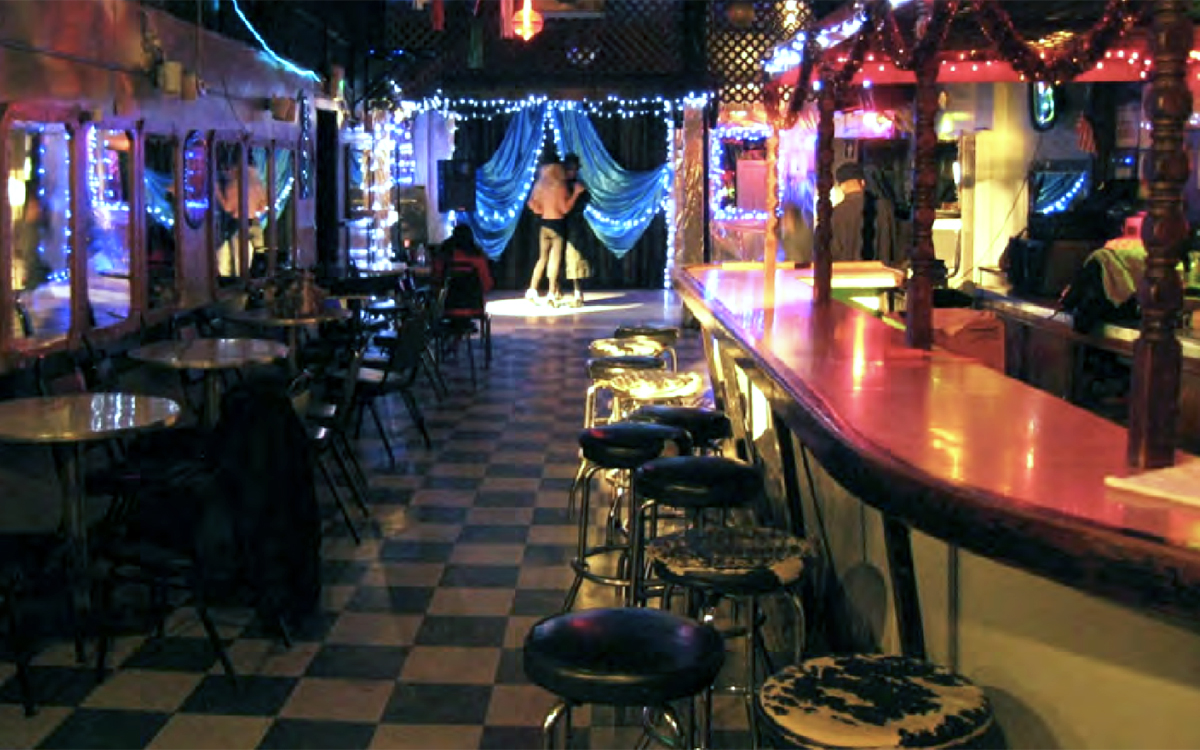 Queer Space/Queering Space, co-taught by faculty from each of AAP’s departments will look at intersections of Queer Culture and Queer Space. Above: a still from Wu Tsang’s film, Wildness (2012). image / provided
Queer Space/Queering Space, co-taught by faculty from each of AAP’s departments will look at intersections of Queer Culture and Queer Space. Above: a still from Wu Tsang’s film, Wildness (2012). image / provided
Queer Space/Queering Space is the first class in recent memory to look at the ways Queer cultures occupy existing spaces and, create new spaces from the perspectives of planners, artists, and architects. Students from all three disciplines can enroll. The seminar is cotaught by associate professor and planning department chair Jeff Chusid, assistant professor of art Alexandro Segade, and associate professor of architecture Val Warke.
Assistant professor of architecture Felix Heisel, in partnership with the S.C. College of Business, will teach The Circular Economy: The Business and Science of Construction, a class that looks into possibilities for innovation in the construction industry as the circular economy makes promising headway toward inventive design, sustainable material, and building practices.
Alumnus Ernst Valery (M.P.A. '01, B.S. URS '00) is teaching a class that straddles real estate and planning titled Development Without Displacement. Valery, founder and president of Ernst Valery Investments, is a planner who has developed projects with an environmentally sustainable, community-minded approach meant to avoid neighborhood gentrification.
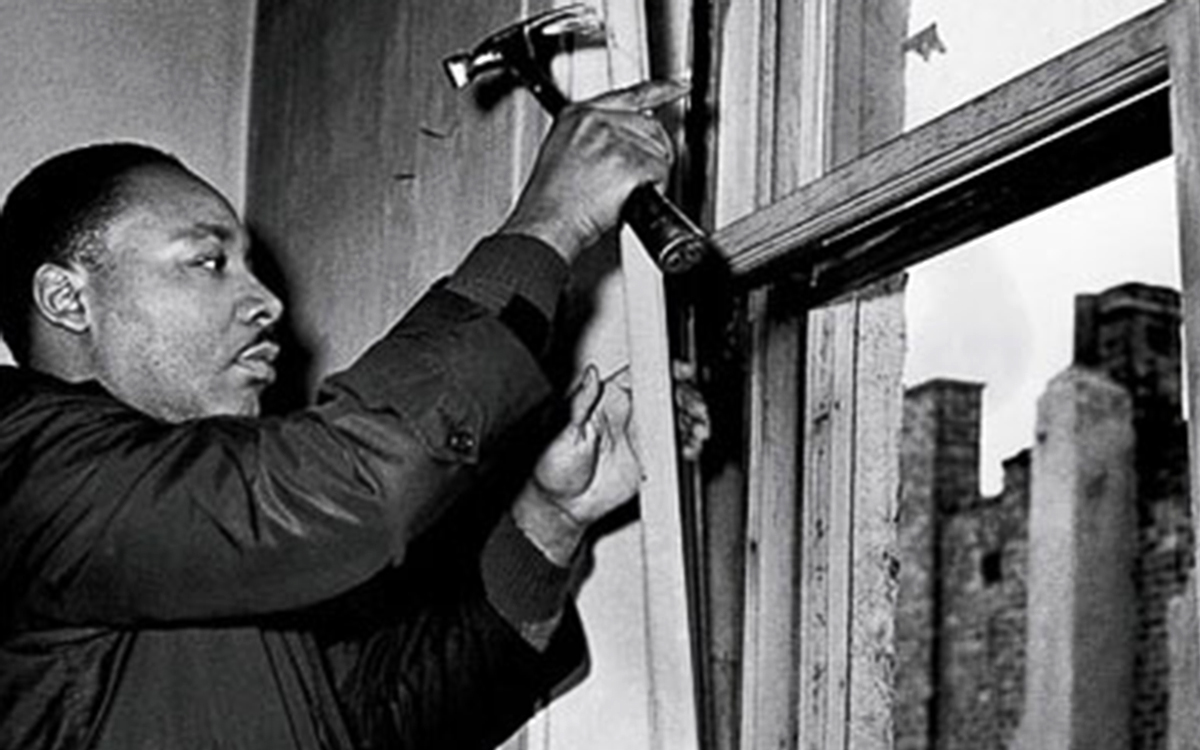 Martin Luther King, Jr. fixing one of the building’s apartments as part of the “End Slums” initiative. image / James Mayo, The Chicago Tribune
Martin Luther King, Jr. fixing one of the building’s apartments as part of the “End Slums” initiative. image / James Mayo, The Chicago Tribune
In a pairing of classroom discussion and the public space of larger community conversations, this spring's Preston Thomas Memorial Symposium and seminar titled Acts of Repair address the topic of repatriation architecture. Architect and visiting critic Paulo Tavares will lead the seminar. Tavares will organize a series of lectures for the symposium with Sean Anderson, associate curator of architecture and design MoMA and co-curator of Reconstructions: Architecture and Blackness in America (with Professor Mabel O. Wilson, Columbia University; former curatorial assistant Arièle Dionne-Krosnick; and Anna Burckhardt, current curatorial assistant in architecture and design). AAP Alumni Sekou Cooke (B.Arch. '99), Olalekan Jeyifous (B.Arch. '00), and Amanda Williams (B.Arch. '97) will be featured in the exhibition that runs from February 20–May 31.
Between and Beyond AAP Campuses
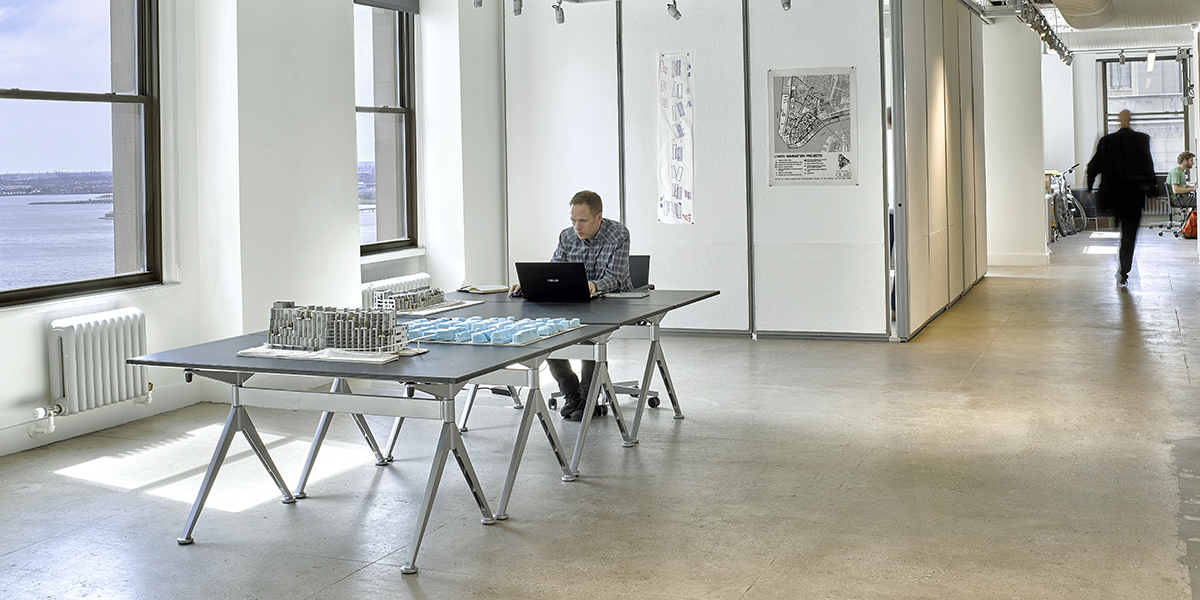 The spring program at the Gensler Family AAP NYC Center will offer in-person studios and several remote classes that are available to all AAP students and encourage collaboration across architecture, CRP, and Cornell's Urban Tech campus.
The spring program at the Gensler Family AAP NYC Center will offer in-person studios and several remote classes that are available to all AAP students and encourage collaboration across architecture, CRP, and Cornell's Urban Tech campus.
In this spring's AAP NYC program, architecture students will take classes at the same space, the same address — the 20th floor of the Standard Oil Building in lower Manhattan. But thanks to a $10M gift from the Gensler family, AAP's New York City-based program takes a new name, The Gensler Family AAP NYC Center. Earlier this year, the family entrusted the college with an endowed gift to support and name the center. Art Gensler helped to found the program in 2006, and it will now be secured in perpetuity.
Though under a new name, the program will move forward much as it did in the fall semester, structured to provide students with the AAP NYC experience to the extent possible, despite necessary adaptations for safety. This spring, students will have opportunities to work with visiting critic and recently named a New Progressive architect Stella Betts of Leven Betts Studio; and visiting professor Florian Idenburg of SO-IL, who will lead a studio in partnership with the artist-run organization Pioneer Works. Electives will be taught by Cynthia Davidson and Misako Murata, among others. The center's executive director, Bob Balder, will lead the longstanding urban design workshop and add a new class with Information Science open to both AAP and Cornell Tech. Students across AAP's campuses and at various remote locations will also have access to the online classes.
Cornell in Rome will again be unable to offer classes at the Rome campus this spring. However, in an effort to make the expertise and knowledge of the college's Rome-based faculty accessible to AAP students, several classes will be taught remotely from Rome. History, special topics, and studios will be available to students across the college. This also includes the M.F.A. seminar, a central component of the program that invites a series of artists and theoreticians to guide graduate students in the fine arts. Jan Gadeyne, Carolina Ciampaglia, Luca Padroni, and Marco Palmieri are among the eight instructors who will teach from Rome.
Cocurricular Conversations
In advance of every semester, each department plans a program of speakers who are invited to give public lectures that are now more accessible than ever thanks to virtual communication technologies. Speakers are largely considered to be not only experts in their discipline but especially primed to address some of the timeliest — though often challenging — topics. Together, the lectures are a complementary extension of classes, studios, and spaces that provide the AAP community an opportunity to participate in important conversations on topics ranging from sustainability, racial and social justice, new and disruptive technologies, among many the many others addressed within the college's disciplines.
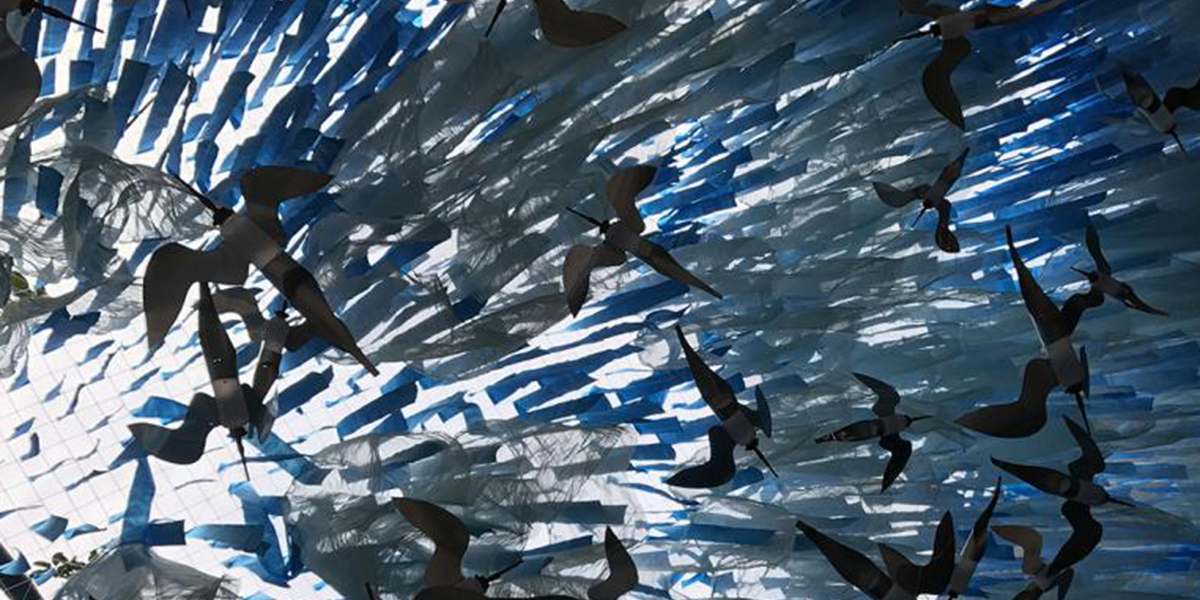 Among many lecturers lined up for architecture's spring series, Swati Chattopadhyay, UC-Santa Barbara, will give a lecture titled Ephemeral by Design. Above: Tridhara Sammilani by Gauranga Kuila, Kolkata, India (2017). image / Swati Chattopadhyay
Among many lecturers lined up for architecture's spring series, Swati Chattopadhyay, UC-Santa Barbara, will give a lecture titled Ephemeral by Design. Above: Tridhara Sammilani by Gauranga Kuila, Kolkata, India (2017). image / Swati Chattopadhyay
In addition to the Preston Thomas Memorial Symposium lectures, spring highlights for the department of architecture include Brick and Tropical Architecture, a lecture by Trần Thị Ngụ Ngôn of Tropical Space, Architecture Without Content with Kersten Geers, chair of architecture at the GSD and founder of OFFICE, and Ephemeral by Design with Swati Chattopadhyay, professor of the history of art and architecture and comparative literature at UC-Santa Barbara.
CRP will host Senator James Sanders, Jr. for his talk on the particular challenges facing District 10 in Queens, New York, as part of their lecture series; and Donnell Baird, CEO of BlocPower, who will speak as part of the Real Estate Seminar Series.
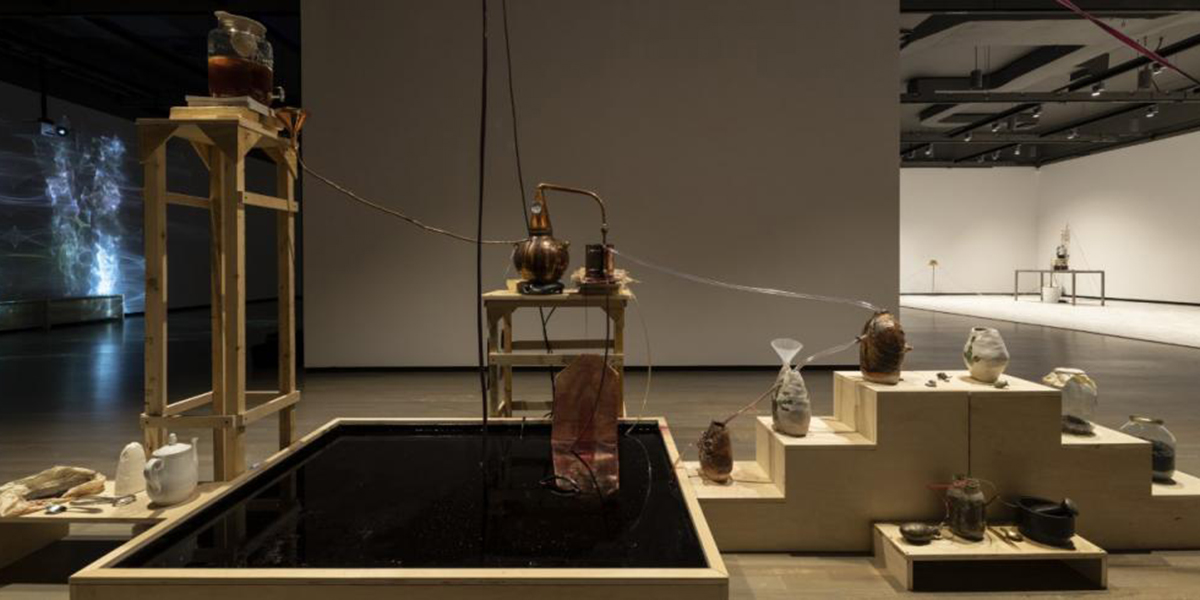 Candice Lin is the spring 2021 Teiger Mentor in the Arts, she will give an artist talk titled A Materialist History of Contagion this semester. Above: installation view of System for a Stain (2016), commissioned by Gasworks. photo / Jessica Wittman
Candice Lin is the spring 2021 Teiger Mentor in the Arts, she will give an artist talk titled A Materialist History of Contagion this semester. Above: installation view of System for a Stain (2016), commissioned by Gasworks. photo / Jessica WittmanThe Department of Art announces a new series of lectures sponsored by alumnus John Cooper; the inaugural talk will be given by prominent artist Catherine Opie. Other artist talks include A Materialist History of Contagion with Spring 2021 Teiger Mentor in the Arts Candace Lin; and Invisible Narratives by Sara Jimenez, a lecture made possible by the Tenaglia Family.
Group and solo exhibitions will also be included in art programming this spring, thanks to the Herbert F. Johnson Museum of Art. The AAP community and larger public will have the opportunity to view student exhibitions by appointment over the course of the semester.
The Spring Ahead at AAP
 The spring 2021 semester began Monday, February 8. AAP students have a number of new paths to pursue with timely interdisciplinary options both within and beyond the college. William Staffeld / AAP
The spring 2021 semester began Monday, February 8. AAP students have a number of new paths to pursue with timely interdisciplinary options both within and beyond the college. William Staffeld / AAP
Both the summation of the fall and entry into a new semester suggest that the college has dialed in adaptive modes of instruction that are both optimized for virtual instruction and flexible enough for hybrid and in-person classes. Priorities include creating courses and support for collaborations that connect academic study, discussion, and design larger world issues beyond classrooms, studios, and the Cornell campus.
Noting challenges and the ongoing demands associated with responding with rigor, creativity, and critical thinking, Dean Yoon quoted poet Mary Oliver in her welcome message, sharing that "things take the time they take." In conclusion, Yoon emphasized that the college intends to work from the knowledge gained from the previous year's shared experiences and apply knowledge developed over time in the new year.

